|
5/2010.
|
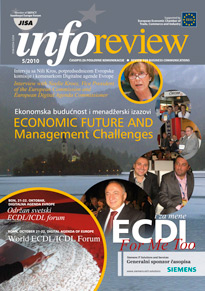
From content 5/2010 we highlight:
Bonn
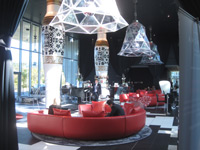
|
World ECDL/ICDL Forum
In the festive atmosphere of the hotel Kamehain Bonn, recently proclaimed as the best business hotel in the world, Rainer Bruderle, the Federal Minister of Economics and Technology, with his welcoming words opened this year ECDL forum, whose host was Germany. More than 200 of delegates from over 80 countries attended the forum. The main topic of the forum was, of course, the recently adopted Digital Agenda of Europe and a range of positive practice of certification of digital education of citizens.
The CEO of ECDL Foundation, Mr Damian O’Sullivan, presented new and more elastic concept of ECDL certification, which enables interested candidates to expand digital education in accordance with their partial affinities and business interests, and Mr Jim Friars, ECDL Foundation Chariman, and Mr VasileBalac, President of CEPIS, highlighted the great opportunity that the Digital Agenda of Europe offers and the funds that will be available in the next period for all interested state institutions, with the aim of promoting recent activities related to digital education of their citizens. |
|
Serbian Army
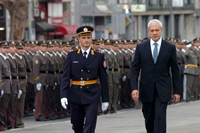
|
European Certificate For The Serbian Officers For The 21st Century
On a ceremonious parade in front of the National Assembly of the Republic of Serbia, in presence of the President Boris Tadic, Prime Minister Mirko Cvetkovic, ministers, army officials and military delegations from USA, Italy, Montenegro, Bosnia and Herzegovina, Macedonia, diplomatic corps, representatives of the European Military Press Association, numerous distinguished guests from Serbia and other countries, and citizens, graduates of the 130th and 131st classes of the Military Academy presented themselves to the nation. Although 134 Second Lieutenants threw their military hats in the air, four of them will continue their military career in the Army of Montenegro.
The first in the rank was Second Lieutenant Nikola Fejsov with GPA 9.73, the second was Ivan Tubin with an average 9.51, while the third most successful cadet was Milos Randjelovic with an average score of 9.35. The President of the Republic traditionally awarded the first three top cadets with officer sabres.
The top Second Lieutenants by battalions Land Force, Air Force and Air Defence, and Logistics, Dusan Stanic, Slobodan Vukojevic and Ivan Velickovic were awarded with guns by the Minister of Defence Dragan Sutanovac. |
|
Digital Agenda for Europe
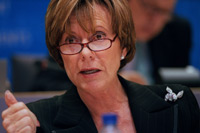
|
Interview with Neelie Kroes, Vice President of the European Commission and European Digital Agenda Commissioner
The Digital Agenda for Europe is the European Commission's policy programme supporting the Europe 2020 strategy. Its main objective is to make best use of information and communication technologies (ICTs) for the benefit of European citizens and businesses. It identifies a number of priority areas in which we will focus our efforts over the next years. These are creating a digital Single Market; increasing the levels of trust and security online; bringing fast and ultra fast internet access to all; offering citizens the skills they would need to fully participate in our digital society; using ICTs to tackle challenges like climate change and the ageing population; make sure Europe has the right tools to support ICT research and innovation; and improve the framework conditions for interoperability between ICT services, applications and devices.
The Commission and Member States have committed to work together to achieve significant progress in these areas. |
|
IEDC
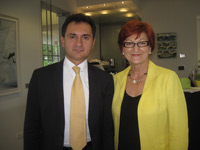
|
Economic Future and Management Challenges
The two-day 2010 SEE Management Forum Bled-Kopaonik entitled “Economic Future and Management Challenges” concluded at IEDC-Bled School of Management. The event, organised by IEDC in cooperation with the Serbian Association of Economists, attracted 300 business, government and non-government leaders from 17 countries. At the Forum the participants sought for answers to questions on economic future and management challenges in order to reach higher growth and welfare in South Eastern Europe and beyond. As Prof. Dr. Danica Purg, president of IEDC-Bled School of Management, highlighted, at the two-day SEE Management Forum Bled-Kopaonik the participating business leaders and politicians of South Eastern Europe had discussed the ways out of the crisis and how to contribute to a healthier and more sustainable development. According to Prof. Purg, the Forum’s purpose had mainly been the exchange of opinions and experiences, joint solution-seeking and social gathering. |
|
Zagreb Stock Exchange
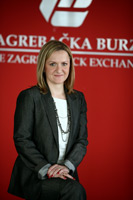
|
Cooperation On The Stock Exchange Level
Above all in the role of a successful manager, and also as a participant of the Management Forum Bled-Kopaonih 2010, Ivana Gazic, the President of the Zagreb Stock Exchange Management Board, agreed to answer a couple of questions related to the economic future and management challenges with the aim of achieving higher economic growth and welfare in the South East Europe and beyond.
How do you see the future of the region?
The future of the region is in cooperation and dialogue: connecting people and business ideas is crucial.
Cooperation on the stock exchange level in ex-Yu region is excellent: the stock exchanges from former Yugoslav republics are contractors of the Memorandum of Partnership whose goal is to jointly organize the regional capital markets roadshows in order to promote top regional companies and their capital markets, and to attract new investors, as well as working on other types of promotion of regional capital markets. Since the Zagreb Stock Exchange is the biggest one by market capitalization among the countries of former Yugoslavia, the ZSE had ambitions to become regional hub in southeastern Europe. |
|
SBS

|
SBS Celebrated Its 19 Years of Existence
Like in previous years, Serbian Business Systems (SBS) enterprise celebrated its anniversary at the beginning of October, marking its 19 years of existence. This year too, the company used the celebration to meet its customers in Serbia and the region, who use the company’s quality and modern IT solutions, high-end equipment, and professional services.
SBS was founded on October 1, 1991, as a general agent of IBM for the territory of the FR Yugoslavia, under the name SBS IBM Alliance Local Service Organization, and continued the business operations of the company Intertrade, which had represented IBM in SFRY since the 1960s.
Therefore, it is not surprising why the history of the company is tightly connected with the development of information society in Serbia. Its contribution to the technological competence of domestic market and its continuous efforts to make our country recognisable by the qualities, innovations and modern technology and business solutions on the basis of its own results have been recognised through many acknowledgements awarded during the previous years. |
|
SBS
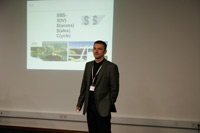
|
SBS Brightened Its Image In Bled
In late October, more precisely on October 18 to 19, Bled hosted the first meeting of IMB’s business partners, dedicated to the XIV Storage System. It gathered the representatives from Central and East Europe, Russia and Commonwealth of Independent States, Turkey and Baltic states, in order to provide deeper insight into the strategy and directions of its further development. Experts from various fields transferred essential business information to the participants, which helped them to become more familiar with the XIV Storage System.
Two years after it was launched, the XIV became a very successful product in the global market, with around 3240 installed units. It showed great business value in all industrial branches, both from the basic models with lowest storage capacities to those which storage capacity is over a few petabytes. At the numerous sessions, participants could learn more about the most successful installations, so that they would be able to implement the same solutions in their countries. |
|
MDS

|
Next Generation Intrusion Prevention Systems
Today’s threats are not simply addressed by putting an IPS on the main connection any more, due to the porous perimeter. Many threats are no longer simply ‘in stream’ but are encoded in Web 2.0 zip applications, needing a different form of processing. It is now common for machines to be ‘owned’ and added to zombie farms, yet they may not trigger for months.
Attackers have all day to plot their attack. They will analyze the target and know the OS that they will mount attacks against. If they know the IPS that they are facing , it is possible for them to create an attack (using available fragmentation tools) that is broken up in such a way that will be assembled ‘incorrectly’ by the IPS and assembled ‘correctly’ by the target. The IPS will see different data and will not trigger, whilst the target is compromised. |
|
Siemens IT Solutions and Services
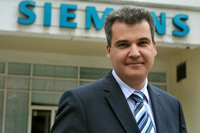
|
Five years of successful operations in Serbia
These days, we had at least two good reasons to talk with Dragan Stokic, General Manager of Siemens IT Solutions and Services. The first one was related to the first five years of successful operation within Siemens, marked in September, while the second reason was that the company had just added the abbreviation “d.o.o”. It is not so hard to guess what the third reason might have been, but in any case, we will reveal it at the end of the article.
Practically, from the September 1, you are again organised as an independent legal entity, Siemens IT Solutions and Services d.o.o. Beograd. How and why did that happen?
It is the result of the global decision, which affects all countries where Siemens IT Solutions and Services is present, and where we continue to operate as an independent legal entity. From the beginning of 2005 until January 1, 2009, we operated as an independent company, and up till now, as one of divisions of Siemens d.o.o. Beograd. |
|
Siemens IT Solutions and Services

|
Project Luris, An Example To Look Up To
At the October conference dedicated to Information Systems of the State administration in Republic of Serbia (IS DOS), domestic company Siemens IT Solutions and Services presented the project Luris, realized for the needs of the International Legal Assistance Department of the Ministry of Justice. The project was presented by Bojan Jancevic, Master of Science in Electrical Engineering and Certified Project Management Professional, who has been working in this company for nine years, and currently is in the position of the Project Management Practice Manager.
With his presentation, he informed the attendees about all important aspects of the project – who its participants were, what was the scope of the project, which technologies were applied, which project management method were used – and its most important results.
“It all began around two years ago, when the Government of the Netherlands decided to transfer its international legal assistance best practice to the Government of Serbia, by donating the software system Luris, which it has been using as well”, Jancevic explained. |
|
Microsoft

|
Fight Against Piracy
Interview with Dragomir Kojic, legal representative of BSA for Serbia
What is Business Software Alliance (BSA)?
BSA is an international, non-governmental organisation, whose members are the biggest software producers (Microsoft, Adobe, Autodesk, and other) and which deals with the promotion of legal software and with fight against piracy. In Serbia, it has been active since 2002.
What are the basic activities of BSA?
BSA organises the whole range of activities, such as:
Organisation of marketing campaign and educational seminars about the fight against the piracy,
Enabling citizens to anonymously report piracy via Internet on our website www.bsa.org,
Sending of letters about copyright infringement to the subjects we suspect are using illegal software, with an invitation to legalise it,
Direct contact and negotiations with users of illegal software in the process of legalisation,
Signing settlement agreements with users who legalised their software, Initiation of various legal actions against users of pirated software, especially initiation of controls conducted by tax inspectors. |
|
Vlatacom

|
Turnkey solutions for production of biometric ID and travel Documents
Biometric matching systems such as AFIS (Automated Fingerprint Identification
System), IIS (Iris Identification System) and FIIS (Facial Image Identification
System) are at the core of e-Government identity infrastructure. They allow a
whole range of improvements in citizens' security, such as:
Smart biometric ID documents (e-ID cards, passports, driver licenses)
Passports and Visa control matched with holder's biometrics (documents
issued according to ICAO standards)
Biometric records of persons with criminal history in order to support the law
enforcement agencies in establishing the suspects' identities
Fast and reliable identity checks with or without the ID document of the
person being checked
If applied to criminal police procedures, crimes can be resolved from
recovered traces of fingerprints, palm prints or surveillance camera records.
These systems are used for collecting, storing, searching and matching
respective biometric data along with the textual information (such as name,
address, date and place of birth, etc.). |
|
NPS

|
Microsoft Dynamics NAV through a “software as a service” model
Today, business operations cannot be imagined without the application of information technologies. ERP systems, although not a novelty for a while, are still not present in respectable number of locations, but what is certain is that it will become synonymous with successful business in the very near future, regardless of the activities or the size of a company.
Numerous researches bring out the fact that majority of enterprises have the need to fully control their business operations and to effectively and economically lead business processes. Fast changes of market conditions impose new demands on ERP solutions and companies that are dealing with their implementations – today, what is the most important than ever before is the fast and simpler implementation of a new information system. That was the reason why companies NPS and Asseco SEE, in cooperation with the local Microsoft office, initiated a unique project of a new concept of providing information services, called “Software As A Service”, i.e. they offered the possibility of renting of business (ERP) solution Microsoft Dynamics NAV and appropriate information (SW + HW) platform. |
|
INFOFEST 2010
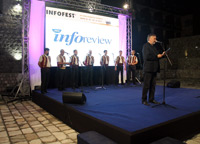
|
To be seen better
One of the oldest towns on the coast of Adriatic Sea, which nature endowed with unique beauty of the Sun, sea and pearly beaches, at the bottom of giant mountain lies Budva, the metropolis of tourism, the city of theatre and festivals, and the most visited destination in Montenegro. This autumn, 17th year in a row, Budva was the host town of the Festival of Informatics Achievements INFOFEST 2010. INFOFEST 2010 started in an already traditional manner, in festive atmosphere, in front of a large number of guests from political, economic, and public life, with the verses of prominent actor Slobodan Marunovic and musical accompaniment by vocal ensemble Assa Vocce. Guests and organisers were welcomed and greeted by the Vice President of the Municipality of Budva, Lazar Radjenovic. In the name of organisers, the attendees were greeted by Milica Pejanovic-Djurisic, and the Festival was opened by Ivan Radulovic, a student of the Faculty of Electrical Engineering in Podgorica. With over 1.000 registered participants, Infofest again met the expectations and justified the status of a manifestation of a national importance in Montenegro and one of the most important regional event in the field of information communication technologies. |
|
ECDL- INFOFEST
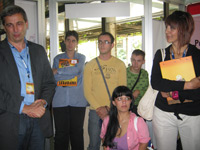
|
ECDL For Me Too
Ministry for Information Society of Montenegro has been putting great efforts into development and application of ICT from its beginnings, not just through defining of strategies and participation in creation of legal frameworks, but through actual promotional activities, which secures the realisation of desired goals as well.
During this year, the Ministry have initiated great number of activities aiming to make citizens more interested in the development of ICT and their application in everyday life. The festival of informatics achievements INFOFEST was a perfect opportunity to present new achievements and provide stimulus for other actors from ICT sector to drive attention to end-users and improvement of their digital literacy. Related to this, just before the Infofest 2010 was opened, the Montenegrin Government adopted the ECDL Standard Implementation Strategy.
The first group of 28 candidates (persons with special needs), who were given the opportunity, through the project “ECDL For Me Too”, to became digitally literate according to the ECDL standards, visited the Infofest and ECDL Partner Centre stand – Cikom, which participated in the realisation of the project. |
|
TeleGroup
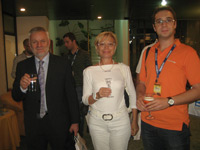
|
TeleGroup Presented mPayment Solution At Infofest 2010
The solution presented at Infofest 2010 is the result of the cooperation between TeleGroup d.o.o Belgrade and DunavNet Novi Sad, which complementarily deal with mobile phone network technologies and applicable software solutions created for mHealth, mPayment, and M2M platforms. All the platforms are based on innovative software solutions and work regardless of the mobile phone model, and are at the same time based on the most modern data protection systems, which is always highlighted when it comes to this kind of solutions.
These very aspects of safety stimulated significant increase of using mobile phones for conducting financial transactions, which is confirmed by official data on the increase of global mPayment transactions.In our region, the recorded increase from 2008 until today was around 80%, while, in the West Europe, that same increase equals 85%.
|
|
Infoarena
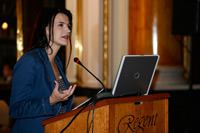
|
9th Human Resource Management Arena
Over 200 attendees from all over the region gathered in Zagreb on October 13, at the “9th Human Resource Management Arena“ – conference about human resources management, traditionally organised by Infoarena Group, in cooperation with Selectio and Moj posao. During the introductory part of the Conference, the participants discussed the trends and importance of HR in overcoming the recession and post-recession period. Jasmina Sockovic, the Director of Selectio d.o.o., presented a research, which was at the same time conducted by Selectio and Moj posao. According to the research, the main challenges that HR faces today are development of the motivation and awarding system, change management, integration of HR into business processes, and partnership with the Government. Dr Nadya Zhexembayeva, professor of sustainable development in the Bled School of Management (IEDC), stressed that present-day “Human Resource Managers” are transforming into “Human Talent Leaders”. Namely, mentioned leaders, among other things, have the abilities and understanding of the organisation in the broader social context, and possess change management skills. |
|
HLI
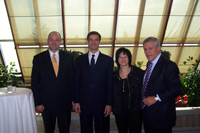
|
Cooperation between Serbia and Greece
The Hellenic Leadership Institute (HLI) and the Greek Serbian Business Council organized in October a conference-workshop in Belgrade Serbia, “Enhancing
Entrepreneurship in Serbia, SMEs & Economic Development”, under the auspices of the Hellenic Aid - Ministry of Foreign Affairs. The conference-workshop placed special focus on business and entrepreneurship in Serbia and the enhancement of cooperation between Serbia and Greece, with special emphasis on SMEs and the contribution of civil society in the economic development.
The conference-workshop was addressed to business people, journalists and NGO representatives, and a total of 50 participants attended the event. The response of the audience and the interaction between speakers and participants was dynamic, and a lively discussion took place on issues of public policy, education, entrepreneurship, and economic development in Serbia.
Mr. Symeon Tsomokos, President of the Greek Serbian Business Council, and Mr. Anthony Livanios, President of the Hellenic Leadership Institute (HLI) opened the proceedings of the conference and welcomed the participants. |
|
CITIZEN

|
Alternative Energy Drive
“The responsibility towards the planet includes even the smallest gesture which contributes to the preservation of the environment“. This sentence is borrowed from the introductory text of the campaign which CITIZEN conducted in 1995 to present its first green watch CITIZEN Eco-Drive. Today, four out of five Citizen’s watches are equipped with Eco-Drive mechanisms.
The driving energy is drawn from a silicon cell which transforms natural, but also light form artificial sources, into low voltage electric energy. Miniature battery provides energy for 180 days of operation. Promoters of Citizen’s revolutionary technology calculated that during fifteen years (which is an average life of a battery powered mechanism) watches with quartz movements deplete five to six cellular, hardly biodegradable batteries. If applied widely, this patent would only in Europe, where the number of quartz watches is estimated to more than a hundred million, bring savings of at least a half of billion batteries. “Forget about new batteries, expose your watch to day light or put it beside your desk lamp” – is one of the advertising slogans. |
|
EEIG Favourites

|
Euro koex d.o.o.
Euro koex d.o.o. is the exclusive agent of the French company Presto, the European leader in production of anti-vandal sanitary armature for many public buildings, such as sport centres, wellness and spa centres, public drinking fountains in parks, schools, kindergartens, city markets, and similar.
The advantages of implementation and application of Presto sanitary armature are: Energy savings – time valve and photo cells on taps and showers automatically regulate the time of water flow (15-30 sec) and after that period, they stop the water flow. Built-in mixing valves for hot and cold water automatically regulate the temperature of hot water, regardless of the temperature of the water within the building. Hygienic protection of users–With one touch of a button (time valve) or by interrupting infrared rays (photo cells), the water flow, which stops after a certain period of time, is activated, which satisfy the basic hygienic conditions, because user do not touch the taps with clean hands. There is a special program available for ill or disabled persons (activation by pressing foot or elbow switch, and similar). |
|
SACEN
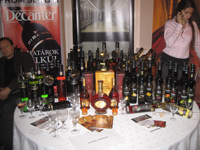
|
Food And Wine Festival
Under the patronage of the Government of the Republic of Serbia, Ministry of Agriculture, Water Resources and Forestry, Ministry of Economy and Regional Development, and the Tourism Sector, 12th International food and wine festival of South East Europe was held. The festival was started by opening the bottle of the first champagne wine produced in Sumadija. The State Secretary in Ministry of Agriculture, Milan Petrovic, said that the production of wine in Serbia was symbolic, and that the goal of the Ministry was to increase the number of vineyards, wines with geographic origin, and competitiveness of domestic wines. He said that Serbia had 49 wine cellars in the system of geographical origin, which was several times more than in previous years. The President of International organisation for tourism development, Dragan Gligorijevic, said that they were not afraid of the “opening of borders”, and that Serbian wines were competitive in foreign markets. “Once, we were major wine producers, and now we see vineyards and wine cellars opening again,” he said. |
|
Terazije Theatre

|
Gloria
With Belgrade premiere of musical “Glorija” on October 5, Terazije Theatre started its 2010/11 season. Well known script written by Ranko Marinkovic was adapted by Jovan Cirilov, while the original songs were composed by Maja Pelevic. The musical, which was coproduced by Terazije Theatre and Budva City Theatre Festival, was directed by Iva Milosevic, who was in the director seat at Terazije Theatre for the first time. The original music was composed by Kornelije Kovac, while Boris Caksiran made costumes, Gorcin Stojanovic made scenography, Danica Arapovic made choreography, and conductor was Milan Nedeljkovic. The title role of Glorija is played by Ivana Knezevic, while other actors include Ivan Bosiljcic (Don Jere), Rade Marjanovic (Rikardo Kozlovic), Feða Stojanovic (Don Zane), Dusko Radovic (Bishop), Milan Milosavljevic (Toma) i Katarina Gojkovic (Mother). Ballet and choir of Terazije Theatre also participate in the show. |
|
|
Content 5/2010
010 International ECDL/ICDLForum held
016 Serbian Army: European Certificate For The Serbian Officers
026 Digital Agenda for Europe: Interview with Neelie Kroes, Vice Presidentof the European Commission and European Digital Agenda Commissioner
032 Bled: Economic Future and Management Challenges
040 Zagreb stock Exhange: Cooperation On The Stock Exchange Level
046 SBS Celebrated Its 19 Years of Existence
048 SBS Brightend Its Image In Bled
052 MDS: Next Generation Intrusion Prevention Systems
058 SIEMENS IT SOLUTIONS AND SERVICES: Five years of successful operations in Serbia
064 SIEMENS IT SOLUTIONS AND SERVICES: Project Luris, An Example To Look Up To
072 Microsoft: Fight Against Piracy
|
080 Vlatacom: Turnkey solutions for production ofbiometric ID and travel Documents
084 NPS: Microsoft Dynamics NAV through a “software as a service“ model
088 INFOFEST 2010: To be seen better
096 ECDL- INFOFEST: ECDL For Me Too
102 TeleGroup: Presented mPayment Solution At Infofest 2010
104 Infoarena: 9th Human Resource Management Arena
110 Hellenic Conference: Cooperation between Serbia and Greece
114 CITIZEN: Alternative Energy Drive
116 EEIG Favourites: Euro koex d.o.o
118 Food And Wine Festival
120 Terazije Theatre: Gloria |
|
|


